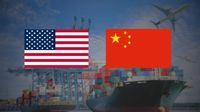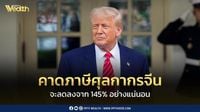President Donald Trump has signaled that the upcoming trade negotiations between the United States and China this weekend in Switzerland could be more significant than initially anticipated. Speaking to reporters on Thursday, May 8, 2025, Trump expressed optimism about the discussions, stating, "I wouldn’t be surprised if we reach an agreement." He emphasized that both nations stand to benefit from a resolution, noting that China is eager to resume business operations that have been hampered by tariffs.
Leading the U.S. delegation will be Treasury Secretary Scott Bessent, who is set to meet with Chinese Vice Premier He Lifeng, responsible for economic affairs. Trump remarked, "We’re going to have a good weekend with China," highlighting that the current situation has left China with limited business opportunities due to the high tariffs imposed by the U.S. He further stated, "We want to see them succeed," indicating a willingness to foster a more favorable trading environment.
In a related announcement, Secretary of Commerce Gina Raimondo revealed that the U.S. plans to unveil several trade deals in the coming months, although the 10% tariffs on various countries are expected to remain in place. Raimondo noted that the administration is committed to reducing tensions with China through these negotiations, which are closely watched by global markets.
Trump's trade policies have been characterized by significant tariffs, including a staggering 145% on many Chinese goods. He has also indicated a potential reduction in these tariffs, saying, "It can’t go up anymore. It’s at 145%, so we know it’s coming down." This statement reflects a shift in strategy as the U.S. aims to negotiate a more balanced trade relationship.
Adding another layer to the negotiations, Trump mentioned the case of Jimmy Lai, a former media mogul in Hong Kong, stating, "I think talking about Jimmy Lai is a very good thing. We will bring this up in discussions." Lai is currently facing serious legal challenges under China's national security laws, and the mention of his case could complicate the already tense relationship between the U.S. and China.
Scott Bessent has underscored the importance of these talks, indicating that the U.S.-China relationship is among the most critical issues facing the global economy. He stated, "This is the most important thing happening right now." As both nations prepare for their high-level discussions, the outcome remains uncertain, with analysts warning that the path to a comprehensive agreement may be fraught with challenges.
Stephen Olson, a former U.S. trade negotiator, expressed skepticism about the likelihood of a swift resolution, suggesting that the ongoing trade conflict is unlikely to be resolved easily. He noted, "The conflict between the U.S. and China will not be resolved anytime soon," and emphasized that any agreement will require active collaboration from both presidents.
International Monetary Fund (IMF) chief economist Swartz Prasad echoed these sentiments, stating, "The most important thing is that it should be a level playing field," while also stressing the need for robust protection of intellectual property rights. He pointed out that the success of these negotiations hinges on whether both parties will adhere to such principles.
The trade discussions come at a time when the U.S. is grappling with a significant trade deficit with China. Trump has expressed concerns about this imbalance, stating that China has not purchased enough American goods. He has made it clear that the U.S. seeks to open markets for American products and reduce the trade deficit.
As both nations prepare for their meeting, the stakes are high. The U.S. has previously imposed tariffs on a range of goods, including steel and aluminum, at rates of 25%, while reciprocal tariffs on Chinese goods have led to a complicated trade landscape. The upcoming negotiations represent a critical opportunity for both sides to address ongoing grievances and potentially pave the way for a more equitable trading relationship.
Despite the optimism expressed by Trump and his administration, analysts caution that the negotiations may not yield immediate results. The complexities of international trade, coupled with domestic political pressures, could hinder progress. As the world watches closely, the outcome of this weekend's talks will likely have far-reaching implications for global trade dynamics.
In conclusion, the upcoming trade negotiations between the U.S. and China are poised to be a pivotal moment in the ongoing trade saga. With both sides expressing a desire to resolve issues and move forward, the discussions in Switzerland could set the tone for future relations. However, the challenges remain significant, and it remains to be seen whether a lasting agreement can be reached.





